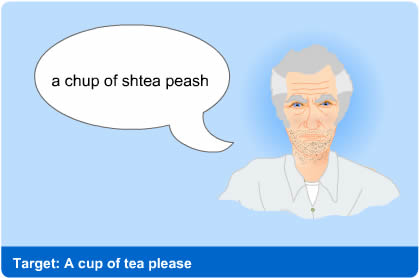
Why do some people have communication problems after a stroke?
Communication is a complicated process so it is not surprising that the brain has more than one area dedicated to communication. Different areas of the brain connect together to collect, understand and respond to all the different types of communication. A stroke can affect these areas or the links between them. This is why some people have different kinds of communication difficulties and others do not have any problems at all.
After a stroke the physical ability to use the muscles of speech, swallowing and control of breathing to support speech can also be affected. Muscles of the face, mouth and chest all contribute to effective communication.
If the person has difficulty in understanding what is being communicated to them, they can have great difficulty in making a response which others can understand. Some people may have difficulty using numbers or gestures.
After a stroke carers have an advantage which healthcare workers do not. You know the person well and you know their likes and dislikes, their sense of humour and how they normally gesture. You also know about their life before the stroke, family, friends, work and other situations which they may be trying to communicate. This knowledge can help you if the person has communication problems.